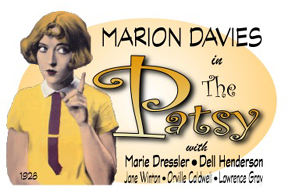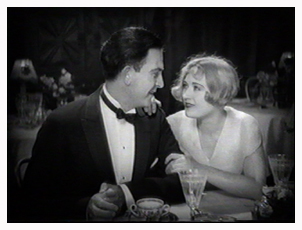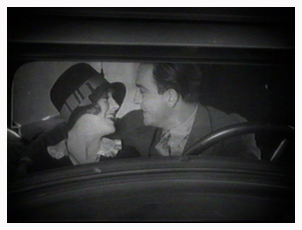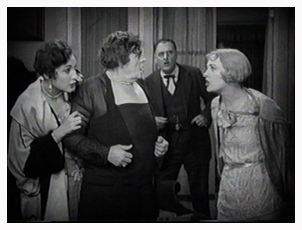

Metro-Goldwyn-Mayer
directed by King Vidor
Premiere: March 10, 1928
Cast: Marion Davies (Patricia Harrison), Orville Caldwell (Tony
Anderson), Marie Dressler (Ma Harrington), Dell Henderson (Pop
Harrington), Lawrence Gray (Billy Caldwell), Jane Winton (Grace
Harrington)
"The Patsy" is one of the silent screen's best comedies, and, if not at the top, very near the top of Marion Davies' film output. Yes, it's that good! And thanks to Turner Classic Movies and Warner Archives, this superb comedy is available today on DVD for the silent film fan to enjoy.
It's a Cinderella story, for sure, with Davies being the
put-upon drudge in her household and constantly given second rate
status to her older sister, Grace (Jane Winton), by her overbearing
mother (Marie Dressler). Her father (Dell Henderson) is on her
side, but he's hen-pecked and kept in check by his dominating
wife. It's not a complicated story. Patsy (Davies), called Pat
in the family, is in love with Tony Anderson (Orville Caldwell)
who is an ambitious entrepreneur, and comes to see Grace. Grace
and her mother constantly ensure that Pat has chores to keep her
out of the room when Tony's around. Pat does finally get the opportunity
to be alone with Tony one evening when the family, including Tony,
are at a formal event at the Yacht Club. The well-known, wealthy,
practical joker Billy Caldwell (Lawrence Gray) entices Grace away
from the table for a ride in his speed boat. When Tony rushes
out to see where the two went, Pat follows and convinces him to
join her in a rowboat in a futile attempt to follow the runaway
couple - thus opening the door for Pat to talk to Tony without
the family's interference. Looking longingly at him, she tells
him that she's in love with a man who doesn't even know she exists.
Thinking he's helping her to win another
man, he readily offers to give her advice on how to snare this
man. In spite of her mother's and sister's efforts to keep her
away from Tony throughout the story, she, of course, ends up winning
him in the end.
her to win another
man, he readily offers to give her advice on how to snare this
man. In spite of her mother's and sister's efforts to keep her
away from Tony throughout the story, she, of course, ends up winning
him in the end.
One of the reasons this film works so well is that it has the right mix of comedy and sentiment. Yes, we see Pat terribly mistreated, but Dressler's and Winton's roles are not totally without redeeming qualities- this is a comedy, after all. One of Ma's tricks for getting her way is to fake aches and pains. For example, we see Pop go through an elaborate routine after dinner to light his pipe, get his newspaper all set, adjust the cushions on the sofa, lie down and make himself comfortable. Ma comes along and sits in the chair beside him. "My neck hurts," she says. "I think I've dislocated my vertebrae again." Pop knows the routine. "Never mind the symptoms," he tells her. "You can have the couch." Grace also treats her sister badly, but it's more the typical bickering sisters, and she backs up quickly when Pat responds aggressively -- coming after her with hands raised like an angry cat about to scratch her eyes out.
The set-up for Pat's miseries is done well in the first 10 minutes of the film. She is the one who serves dinner. When the chicken is carved by Ma, Pat gets the tail, or as she describes it, "the part of a chicken that goes over the fence last." When it's Grace's turn to do dishes, Pat must do them so Grace can entertain Tony. When they get ready to go to the Yacht Club, Grace takes Pat's new evening coat, and when Pat protests, Ma defends Grace. Pat ends up wearing Grace's gaudy, and extremely large, Spanish shawl. When they get ready to leave, Tony offers to let the girls ride in his enclosed car so their hair won't get messed up. However, Ma jumps in with Grace forcing Pat to ride in her Pop's open car.
With this type of family dynamic, it would be easy to wish ill upon one or more characters, however, director King Vidor has balanced things well so it remains a comedy and no character gets so far out of hand as to be unacceptable. Vidor is careful to throw in a few tidbits that let us know, although this may be a somewhat dysfunctional family, there is love there. For example, when Pat is grudgingly washing dishes when it's really Grace's turn, Pop comes in to help her and tells her, "Ma has her good points, Pat." At the end of the film, when things blow up and Pop walks out (faking that he's leaving for good), he hides in the bushes. When Pat comes out, she tells her father, "But, Pop, I do love ma," and Pop responds, "So do I, dammit."
Marion Davies is a whirlwind of comedy throughout the film, too. The part that most silent film fans have heard of is the scene where Davies imitates Mae Murray, Lillian Gish and Pola Negri - and after seeing these "spot on" imitations, one can see why. For audiences today who are not familiar with the performances of these three stars, the imitations won't be as effective, but for those who know Murray, Gish and Negri, the imitations are nothing short of genius. It must be noted, however, that Davies' comedic talents are put to great use throughout the film.
One hilarious episode has Ma and Grace thinking Pat has gone crazy. Actually, she has been advised by Tony to develop a personality in order to win the man she loves. She gets a collection of books, one of which is entitled "What to Say and When," that provides her with things to say that apparently are being misquoted terribly. Prancing around the house and quoting these nutty dictums does, indeed, make her appear crazy, and Pat seems to be enjoying their befuddlement, especially when Ma tells Grace, "I've never told you this, but there's insanity on your father's side of the family." Pat is taking great delight in walking up and down the stairs, in and out of the room, stopping only long enough to state such nonsense as:
"Always remember - Nature gives us many of our features,
but she lets us pick out own teeth."
"Don't cry over spilt milk - there's enough water in it already."
"Work is the curse of our drinking classes."
"Many a live wire would be a dead one if it wasn't for his
connections."
or "No wonder a hen gets discouraged. She can never find
things where she lays them."
Of course there are many other hilarious moments. One that's
worth mentioning is when Billy comes over and is in the living
room kissing Grace. The curtain leading to the  hallway
is open only a couple of feet. Pat walks by the curtain several
times with a different hat and a goofy look on her face. One time
she stops and shakes her finger advising, "When in Bagdad,
do as the Bagdaddies do." Each time Billy tries to kiss Grace,
he sees Pat walk by in these crazy hats and breaks up laughing.
Of course, when Grace turns around, Pat is not there.
hallway
is open only a couple of feet. Pat walks by the curtain several
times with a different hat and a goofy look on her face. One time
she stops and shakes her finger advising, "When in Bagdad,
do as the Bagdaddies do." Each time Billy tries to kiss Grace,
he sees Pat walk by in these crazy hats and breaks up laughing.
Of course, when Grace turns around, Pat is not there.
If ever there was a cast that is a perfect fit for their roles, this is it. Harrison's Reports commented, "It is hardly likely that 'The Patsy' would have been much of entertainment without Marion Davies." (1) This may or may not be so, but it is certainly difficult to imagine anyone who could have matched Davies' performance in this film. Certainly, Davies carries the film, and she is at her best in this one - so good, in fact, that this reviewer prefers "The Patsy" to the much more celebrated "Show People" (1928). Reviewers were unanimous in their praise of Davies' performance, too. Motion Picture magazine said, "After two or three reels of this one, the director tossed away his script - maybe his megaphone, too - and turned the picture over to Marion Davies. Which was a very smart thing to do, for when Marion cuts loose with clowning, the result is that sort of comedy which reflects its results in crowded theaters." (2) The New York Times said, "Of all the varied Cinderellas who have from time to time graced the screen, Marion Davies, in an adaptation of Barry Conners's stage comedy, 'The Patsy,' not only holds her own in the matter of vivacity and appearance, but she also elicits more fun than one would suppose could be generated from even a modern conception of the undying role." (3) And Variety added, "Marion Davies does some really great comedy work." (4)
Marie Dressler was perfectly cast as Ma Harrington. The New York Times reviewer said, "Miss Dressler . . . gives her best contribution to the screen," (5) and this is a far cry from her Tillie days. Yes, she's bossy and overbearing, but not mean. She plays her role not as the "evil stepmother" in Cinderella, but more as the mother who simply favors the older daughter and, from an armchair psychologist's viewpoint, may be trying to live her youth again through her daughter. Of course, Dressler was a master of comedic expressions, which makes her a delight in silent comedy. The facial contortions she makes when she thinks Pat has gone crazy are hilarious, and her utter astonishment and heart-palpitating performance when Pa finally blows his top is classic Dressler.
For those who are more familiar with Henderson in his second banana roles from the thirties (remember his super performance in Our Gang's "Choo Choo!" - 1932), this will not only be a delight but a surprise. With a small mustache, eyeglasses and a little gray at the temples, he's perfect for the part, and, of course, we not only sympathize with him for the treatment he gets at the hands of Ma, but also like him for his noble, albeit weak, defense of Pat. He speaks up for her a couple of times, although it is ineffective. When she has to wash dishes, he goes in to help by drying them. When she's in her room crying because she can't see Tony anymore, he comes up to comfort her. When he finally blows his top at the story's finale, it's all in defense of Pat who is about to get a licking at the hands of Ma. The loving relationship these two have is charming. And speaking of blowing his top, Henderson's performance is superb. The viewer will find himself or herself cheering him along as he stands up to Ma.
Jane Winton tends to get overlooked in the films in which she appears. For example, The New York Times said, "Miss Dressler. . . gives her best contribution to the screen. Del (sic) Henderson is capital as Pa Harrington. . . Orville Caldwell gives an efficient portrait of tony Anderson and Lawrence Gray is good as a wealthy young practical joker." (6) That's right. No mention whatsoever of Winton, although she does a superb job as the minx of an older sister. Like Ma, she's not mean, but she does see herself as the favored one and feels entitled to preferential treatment. Probably the moment in which we want to see her get her comeuppance the most is when she tells Pat to stay away from Tony or she'll reveal that Pat was just making up the business about being in love with another man - "and Tony hates a liar," she says. Pat goes to her room crying while Grace walks away with a smile on her face. However, as noted, Vidor adds just the right touches so these characters don't fall totally out of favor with us. In the end, when Ma and Pa make up, Pat is in the doorway smiling at this loving scene, and Grace comes up and hugs her sister. Winton appeared in about 30 silent films, and in the ones available for viewing today, she always does a commendable job. And, although she was a very attractive actress, it doesn't see that leading roles were her lot.
Orville Caldwell will not be a familiar name to most silent
film fans, and understandably so. Of the 12 silent films he made,
"The Patsy" seems to be the only one available for viewing.
He disappeared from the screen after this film until 1935 when
he came back and appeared in nine sound films between 1935 and
1938. He is a relatively handsome actor,  a
full foot taller than Davies, and extremely good in his role in
"The Patsy." He's not given any comedic moments, but
he's given a portrayal that makes it easy for us to understand
why Pat would fall in love with him.
a
full foot taller than Davies, and extremely good in his role in
"The Patsy." He's not given any comedic moments, but
he's given a portrayal that makes it easy for us to understand
why Pat would fall in love with him.
Lawrence Gray is certainly a more familiar name, but he is given the more peripheral role of the main characters. As wealthy, practical joker, Billy Caldwell, he takes what he wants and ends up stealing Grace from Tony. He's somewhat in and out of the picture, appearing when necessary - to charm and steal Grace away from the event at the Yacht Club, show up at the house right before Tony is to arrive and take Grace out, and the hilarious scene where he is drunk in his apartment and Pat tries to get his attention with her imitations of the stars. Gray is a competent actor who appeared in 46 films between 1925 and 1936; however, in "The Patsy" he does a serviceable job, but nothing outstanding.
One of the best aspects of the film is the title writing which, unusual for most films, got a lot of attention from reviewers of the time. Apparently, many of the titles were taken directly from the play; however, title writer Ralph Spence adapted some and created some, as well, making the intertitles one of the most enjoyable parts of the film. Some examples:
Intertitle as they arrive at the Yacht Club formal: "The Yacht Club - where if Mary had a little lamb it would cost $4.50 per order."
When they think Pat's going crazy, they get her to lie down on the couch and ask her how she feels. She responds, "You know how you feel when you don't know how you feel? That's how I feel."
One of the reasons they think Pat is going crazy is because she's supposedly waiting on a call from Napoleon. When Pat sits close to Grace listening in on her phone call with Tony, Grace tells her, "Go on - it isn't Mr. Bonaparte." Pat responds with all seriousness, "The little devil promised to call."
Arguing with Grace, Pat tells her, "If it wasn't for you, our family tree would die." Graces asks angrily, "What do you mean by that?" to which Pat replies, "You're the sap!"
And, of course, one needs to see the entire film to enjoy intertitles properly within the context of the story and with the excellent portrayal by the actors.
As noted at the beginning, this is one of the best comedies of the silent era, and thankfully there is a pristine print available for our viewing today. This was the first of three comedies that King Vidor was to direct for Davies. He noted in his autobiography, "After the success of 'The Big Parade,' Mr. (William Randolph) Hearts never gave up until he had me directing Miss Davies." He added, "The picture turned out fine, and even got some good reviews outside the Hearst press. It also did well at the box office. I was in solid." (7)
We won't go into the William Randolph Hearst-Marion Davies relationship or the discussion regarding whether she would have stayed on the screen is it hadn't been for Hearst's money. What is a forgone conclusion is that Davies was a superb actress who was definitely at her best in comedy roles such as this - and she certainly didn't disappoint in her more serious roles, either. Photoplay said it was a "delightful picture" with an "exquisite portrayal" by Davies. (8). Variety said it was "a dandy laugh picture for de luxe program requirements." (9) Looking back in 1978, silent film historian William K. Everson said it was "delightful" and "underrated," (10) which is so very true. Bottom line: if you haven't seen it, do yourself a favor and get the DVD - worth every cent, and guaranteed you'll want to share the viewing experience with someone else!
The musical accompaniment provided by Turner Classic Movies is a full orchestral score by Vivek Maddala that is a wonderful addition to the film, although it does tend to overpower in some instances when a more muted accompaniment would have allowed the action to carry itself better.
References
1. "The Patsy" review. Harrison's Reports. April
28, 1928.
2. "The Patsy" review. Motion Picture. June 1928.
3. "The Patsy" review. The New York Times. April
23, 1928.
4. "The Patsy" review. Variety. April 25, 1925.
5. The New York Times.
6. Ibid.
7. Vidor, King. A Tree is a Tree. Harcourt, Brace and Company.
1952.
8. Photoplay.
9. Variety.
10. Everson, William K. American Silent Film. Oxford University
Press. 1978.